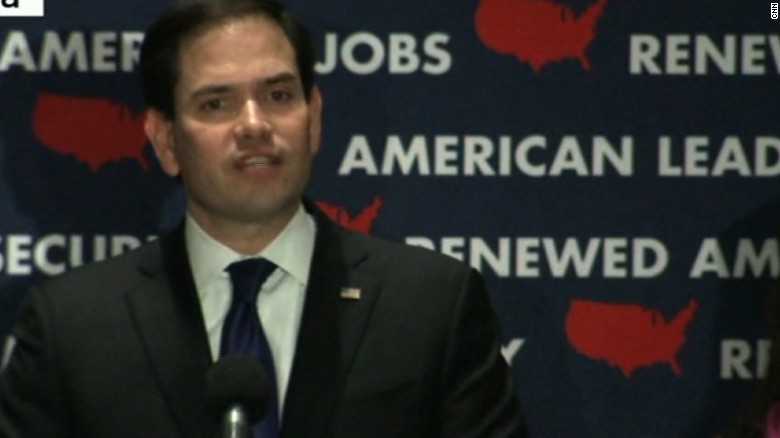Marco Rubio is dropping out of the presidential race after losing the Florida primary to Donald Trump and failing to unite the Republican establishment against the billionaire front-runner.
“America is in the middle of a real political storm, a real tsunami and we should have seen this coming,” Rubio said in Miami Tuesday night in a speech that served as a thinly-veiled rebuke of Trump’s campaign tactics.
“While we are on the right side,” he said, “this year, we will not be on the winning side.”
Rubio’s decision to end his campaign comes on a night of crucial primaries in which Trump is striving to tighten his grip on the Republican nomination. The contests in Florida, Ohio, North Carolina, Missouri and Illinois represent one of the last opportunities for the party’s establishment to mount a credible campaign to stop him and avoid a fight at the convention in July.
In the other big prize of the night — Ohio — John Kasich has won, according to a CNN projection.
On the Democratic side, Hillary Clinton has won the North Carolina and Florida Democratic primaries.
Those victories complete Clinton’s sweep of Southern states where she has enjoyed strong support from African-American voters who will be a crucial part of the Democratic coalition in the general election. Clinton’s facing closer contests in Missouri and Illinois.
Political date with destiny
Trump went into Tuesday’s pivotal voting in the center of another storm — this time over unrest at his rowdy rallies. He left no doubt that he would claim the right to the GOP nomination if he had a good night in the two swing states.
But under some scenarios, Trump’s loss to Kasich in Ohio — even with his win in Florida — could put a speed bump in the billionaire’s path to the nomination and leave open the possibility that establishment support could coalesce behind the Ohio governor.
Cruz’s strong presence in the race, and hopes on Tuesday of picking up substantial numbers of delegates, could continue to help Trump by leaving opposition to him fractured.
Democrats digging in
Democrats, meanwhile, are already digging in for a long struggle, though the electoral mathematics of the race suggest Sanders must start to pull off large victory margins if he is to overtake Clinton’s lead of around 200 pledged delegates.
In fact, as he did last week with an upset win in Michigan, Sanders could grab the headlines by winning in Ohio and elsewhere. But he may fall farther behind his rival in the delegate count with her projected wins in Florida and North Carolina.
Still, Sanders remains a much more potent threat to Clinton than seemed likely when he launched his campaign last year. Many pundits expected the former first lady to have the nomination in her grasp by now.
“When people come out to vote in large numbers to reclaim their democracy, we win. When voter turnout is low, we lose. Let’s make sure that tomorrow we have a huge voter turnout,” Sanders told supporters in Akron, Ohio on Monday night.
The Clinton camp is banking on the former secretary of state’s edge with minority voters to put large delegate hauls in the bank in North Carolina and Florida.
Yet her rival has high hopes elsewhere. Sanders seeks to test whether his assaults on free trade deals, which he blames for economic blight in the industrial Midwest, can resonate in Ohio and Illinois as they did in Michigan.
“I think we have a chance in Illinois, Ohio and Missouri. I think North Carolina and Florida will be more difficult,” Jane Sanders, the Vermont senator’s wife, told CNN’s “Erin Burnett OutFront” on Monday night.
Clinton is trying to counter Sanders’ push on trade as she seeks a way to rationalize her initial support for the huge Trans-Pacific trade deal. She backed the agreement as secretary of state only to oppose it when it was finalized while she was a candidate.
“His position is so ‘anti.’ He is against things before they are even finished, before they are read,” Clinton said at an MSNBC town hall meeting on Monday.
Clinton noted how Sanders was against the 12 -nation trade deal even before it was completed last year.
“He is just reflexively against anything that has any international implication,” Clinton said.
